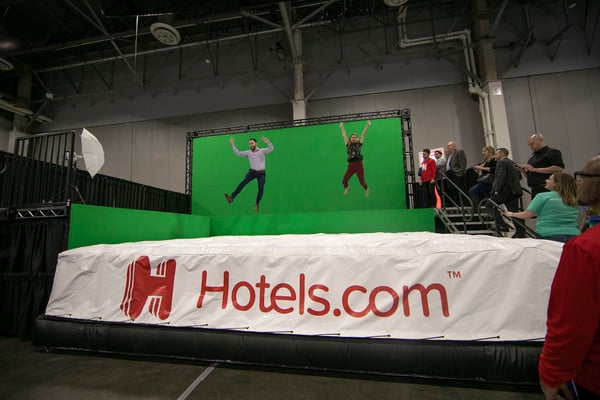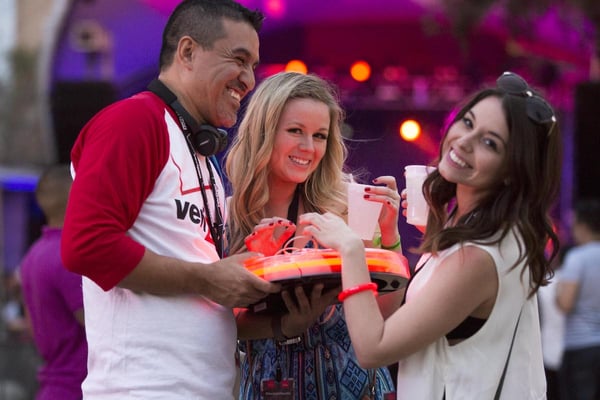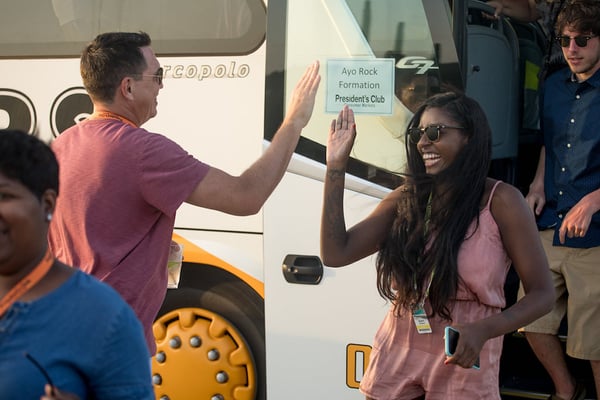As of 2023, millennials account for more than a third of all workers in the U.S., and that number is on the rise. Alongside millennials, Gen Z is also entering the workforce, and soon these younger generations will account for more than half of the labor force in the U.S. But are companies adjusting to align with this new generation of workers?
As these generations step into leadership roles and shape the future of businesses worldwide, it’s imperative to recognize and adapt to their distinct values, preferences, and expectations. In the next few years, corporate events will need to be reworked in order to account for the perspectives and priorities of younger workers.
From their emphasis on sustainability and social responsibility to their preference for experiential engagement and technology, these digital natives are redefining the traditional notions of work and corporate gatherings. Whether you're planning a product launch, corporate conference, or incentive trip, understanding and catering to the millennial and Gen Z workforce is key to creating impactful, memorable experiences.

Quick Links
- Why Audience Matters for Corporate Events
- Understanding Gen Z and Millennials
- Benefits of Corporate Events That Appeal to Younger Workers
- Five Ways to Consider Gen Z and Millennials in Corporate Event Planning
Why Audience Matters for Corporate Events
As an event planner, you know how many hours it takes to plan and conduct an event. Due to all of that time and effort, the last thing you want is for your audience to be disengaged from the speakers, entertainment, and activities. Without crafting events that align with the specific group in attendance, you might miss the mark when it comes to your event goals.
However, events curated to meet the wishes of your audience can be extremely successful, so event planners need to fully understand who their audience is to create memorable experiences specifically for these attendees. With large corporate events, this isn’t always easy. A room full of hundreds means there are a lot of variations among audience members. Some may be people who have been with the company for years, while others might be at the beginning of their careers.
But no matter who is in the room, the program components need to appeal to everyone. Knowing who will be in attendance helps planners determine which platforms to use, which technologies will be effective, and which content should be presented in order to promote the most engagement. The right content will not only boost engagement but will also improve overall satisfaction, which boosts your overall event ROI.
Understanding Gen Z and Millennials
Gen Z and millennials are the two younger generations currently in the workforce. Millennials – people born between 1981 and 1996 (although this time frame is a frequent topic of debate) – make up about 35% of the workforce in the US. By 2025, this number is expected to increase to 75% of the global workforce.
Gen Z, the generation following at their heels, includes people born between 1997 and 2012. Although this group only accounts for 5% of the US labor force, they are making a significant impact on the way businesses treat their employees.
To effectively recognize employees for the work they’ve done, companies need to be agile and shift their practices to align with the values of incoming younger generations. For corporate events, this means taking a digital approach, prioritizing social responsibility, and creating intentional experiences. After all, the number of younger employees is steadily increasing, so companies need to rethink the way they plan their events in order to satisfy a new generation of workers.

Benefits of Corporate Events That Appeal to Younger Workers
While corporate events may sometimes be designed to introduce new products or bring teams together to brainstorm ideas, they are also vital for employee recognition and motivation. But to effectively recognize attendees for exceptional work, these events need to be executed in a way that appeals to the crowd.
In a 2023 survey, 92% of Gen Z employees said they want value and purpose from the companies they work for. So what does this mean for corporate events? For one, the events planned need to do more than just bring people together and connect attendees with new faces. To satisfy the new workforce, events need to work toward a larger purpose. This might mean incorporating fundraising activities, collecting donations for an important cause, or providing volunteering opportunities for guests.
As millennials and Gen Z enter the workforce, corporate events that cater to their unique values promote a positive workplace culture. By crafting meetings in this manner, attendees will not only feel valued for their individual contributions, but they will also feel as if they are an important part of the larger picture.
After the meeting, teams will return to work feeling more motivated, valued, and determined to support their organization because they now know the business aligns with their values outside of the workplace. Emphasizing corporate social responsibility (CSR) has a huge impact on younger audiences.
Five Ways to Consider Gen Z and Millennials in Corporate Event Planning
Now that we know who millennials and Gen Z are, it’s time to incorporate features that will resonate with them. You might already include some of these in your corporate events. If not, here are a few ideas to help you get started.
Utilize Social Media
Perhaps one of the most common characteristics of millennials and Gen Z is their aptitude for technology. As the first generations to grow up with the internet, it makes sense for planners to make the most of online mediums, such as social media.
Traditional advertising might not make as big of an impression on these younger workers. Emails may get buried and anything going to a physical mailbox is likely to sit for some time. However, Gen Z and millennials are highly involved in social media.
So utilizing social media for your event marketing strategy can boost engagement and amplify your reach. Plus, social media can provide important event data that will help you better understand the way your audience is engaging with your marketing efforts.
Encourage Connection
Corporate events are often great opportunities for networking and deepening connections with like-minded people. However, planners can enhance their meetings further by creating opportunities for connections that will resonate specifically with millennial and Gen Z workers.
This might include photo-ops throughout the venue where guests can snap a picture and share it using an event hashtag. Additionally, if your audience is made up of various demographics, try to include sessions that put people of similar ages or interests together. But keep in mind that there is still value in intergenerational connections that bring people with different interests, ideas, and backgrounds together.

Take a Digital-First Approach
If you haven’t used event apps before, now is the time to start, especially if many of your guests are a part of the younger generations we’ve been discussing. With event apps, corporate event planners can make the most of the devices their attendees already have on hand. With their phones, attendees will have access to personalized itineraries, post-event surveys, and chatbots to help answer any questions that come up throughout the event.
As we mentioned, millennials and Gen Z are very familiar with the latest tech gadgets, so don’t be afraid to use them. In fact, event technology like RFID event badges can help easily track check-ins, session attendance, and more.
Plus, the right technology can help younger attendees get more involved in the event. You might add a survey to your event app that allows guests to recommend songs to be played throughout an event. Or you might have audience members use their phones to answer real-time polls during sessions to promote interactions with speakers. There are endless possibilities of how tech can help with overall engagement.
Prioritize Sustainability
Millennials and Gen Z place more emphasis on the impact of their actions, so event planners should be aware of exactly how the event promotes positive social efforts. Millennials increasingly want to be a part of organizations whose values align with their own, which is why CSR is vital. One common value is incorporating sustainable practices.
Luckily, sustainability can be easily woven into corporate events in a variety of ways. For instance, branded water bottles that can be refilled and reused during the corporate event minimize the use of plastic. Or you could consider incorporating sustainable food and beverage practices, such as offering smaller plates on buffets to limit food waste. And even implementing the use of event apps, as we just discussed above, can help limit the need for paper products.
Add an Extra Layer of Value
We mentioned corporate social responsibility and making sure organizations go beyond their products and services to do good for others. These values guide younger employees as they make decisions about the places they choose to work.
For example, you can add extra value to employee recognition events by including fundraisers for local organizations with which the honorees are affiliated. This could be a raffle where guests win swag bags with proceeds donated to the honorees’ charities. Or if you’re planning an incentive travel program to recognize your team, be sure to include a voluntourism activity on the agenda.
Once the meeting has concluded, make sure your post-event survey asks attendees what they would like to see more of in the future. They might provide you with unique ideas for future events. Or they might give insights into ways to improve activities to make them resonate better with younger workers.
With corporate events that are appropriately tailored to audience members, you can create memorable experiences that boost connections and promote increased collaboration. To get started with planning events for businesses with millennial and Gen Z employees, reach out to the expert event planners at Bishop-McCann today!

